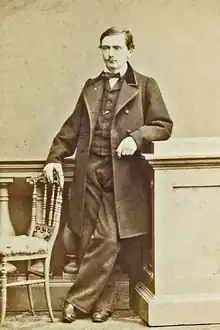Otto von Littrow
Otto von Littrow (14 February 1843, Vienna – 7 November 1864, Vienna) was an Austrian astronomer and physicist. He is known for his contributions in spectrometer instrumentation.[1]
Otto von Littrow | |
|---|---|
 Otto von Littrow around 1863. | |
| Born | 14 February 1843 |
| Died | 7 November 1864 (aged 21) |
| Nationality | Austrian |
| Known for | Littrow prism, Littrow angle, Littrow expansion |
| Scientific career | |
| Fields | Astronomer, Physicist |
| Notes | |
Note that he was the son of Karl Ludwig von Littrow and grandson of Joseph Johann von Littrow. | |
Son of astronomer Karl L. Littrow and women's movement leader Auguste von Littrow, grandson of astronomer Joseph Johann von Littrow, both his father and grandfather were directors of the Vienna Observatory. He studied with Hermann von Helmholtz and Gustav Kirchhoff at the Heidelberg University, and completes his doctorate degree in 1864. He was, as Constantin von Wurzbach puts it, "Destined for a scientific career by talent, birth and upbringing".[2] He dies from typhoid fever in Vienna in 1864.
References
- Kerschbaum, F.; Müller, I. (June 2009). "Otto von Littrow and his spectrograph". Astronomische Nachrichten. 330 (6): 574–577. Bibcode:2009AN....330..574K. doi:10.1002/asna.200911219.
- von Wurzbach, Constantin (1866). "Littrow, Karl Ludwig Edler von". Biographisches Lexikon des Kaiserthums Oesterreich [Biographical Encyclopedia of the Austrian Empire] (in German). Vol. 15. Vienna: kaiserlich-königliche Hof- und Staatsdruckerei. p. 296. on German-language Wikisource and at Austrian Literature Online
This article is issued from Wikipedia. The text is licensed under Creative Commons - Attribution - Sharealike. Additional terms may apply for the media files.